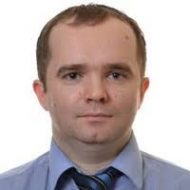
Maksims Ivanovs has been working at the Institute of Electronics and Computer Science (EDI) since 2019. He has obtained a Bachelor degree with distinction in English philology from the University of Latvia in 2015; during his undergraduate studies, he did exchange studies at the University of Oslo, the University of Tartu, and the University of Mainz as well as was awarded Kristaps Morbergs scholarship for three consecutive years. Afterwards, he did Masters in Cognitive Science at the University of Osnabrück in Germany, specializing in cognitive psychology and neuroscience. During his master’s studies, he was supported by a DAAD scholarship. He did his master’s thesis concerned with the rat motor cortex at Max Planck Institute research group In Silico Brain Sciences at Caesar research center in Bonn. After graduation, he took part in the SmartStart2 predoctoral research program in computational neuroscience jointly organised by Bernstein Center Computational Neuroscience and Volkswagen Foundation, working on the projects in the fields of neurobiology and deep learning. Currently, he is doing a PhD in computer science at the University of Latvia, working on the topic of generating synthetic data for training deep neural networks under the supervision of Dr. sc. ing. Roberts Kadiķis. In academic year 2019-2020, he was awarded Alfreds Raisters memorial scholarship. His academic interests are mostly related to deep learning and artificial intelligence in general as well as to the impact of these fields on society.
Recent projects
- Automated hand washing quality control and hand washing quality evaluation system with real-time feedback (Handwash) #LCS (LZP)
-
 Intelligent Motion Control under Industry 4.E (IMOCO4.E) #H2020
Intelligent Motion Control under Industry 4.E (IMOCO4.E) #H2020
- AI-improved organ on chip cultivation for personalised medicine (AImOOC) #H2020
-
 Towards an ecologically valid symbiosis of BCI and head-mounted VR displays: focus on collaborative post-stroke neurorehabilitation (ReHaB) #Chist-era / Flag-era
Towards an ecologically valid symbiosis of BCI and head-mounted VR displays: focus on collaborative post-stroke neurorehabilitation (ReHaB) #Chist-era / Flag-era
- Holographic microscopy- and artificial intelligence-based digital pathology for the next generation of cytology in veterinary medicine (VetCyto) #Chist-era / Flag-era
Recent publications
- Lulla M., Rutkovskis A., Slavinska A., Vilde A., Gromova A., Ivanovs M., Skadins A., Kadikis R., Elsts A. Hand-Washing Video Dataset Annotated According to the World Health Organization’s Hand-Washing Guidelines. Data. 2021; 6(4):38. https://doi.org/10.3390/data6040038
- Maksims Ivanovs, Roberts Kadiķis, Kaspars Ozols. 2021. “Perturbation-based methods for explaining deep neural networks: A survey” Elsevier B.V., https://doi.org/10.1016/j.patrec.2021.06.030
- Skadins, A., Rava, R., Ivanovs, M., Nesenbergs, K. (2020). Edge pre-processing of traffic surveillance video for bandwidth and privacy optimization in smart cities. 17th Biennial Baltic Electronics Conference (BEC2020) Tallin, Estonia.
- Judvaitis, J., Mednis, A., Abolins, V., Skadins, A., Lapsa, D., Rava, R., Ivanovs, M. and Nesenbergs, K., 2020. Classification of Actual Sensor Network Deployments in Research Studies from 2013 to 2017. Data 2020, 5(4), p.93., https://doi.org/10.3390/data5040093
- R. Rava, M. Ivanovs, A. Skadiņš, K. Nesenbergs "World Coordinate Virtual Traffic Cameras: Edge-Based Transformation and Merging of Multiple Surveillance Video Sources", 2020 7th International Conference on Soft Computing & Machine Intelligence (ISCMI), (pp. 233-236). IEEE. DOI: 10.1109/ISCMI51676.2020.9311597
- Ivanovs, Maksims, Kaspars Ozols, Artis Dobrajs, and Roberts Kadikis. 2022. "Improving Semantic Segmentation of Urban Scenes for Self-Driving Cars with Synthetic Images" Sensors 22, no. 6: 2252. https://doi.org/10.3390/s22062252